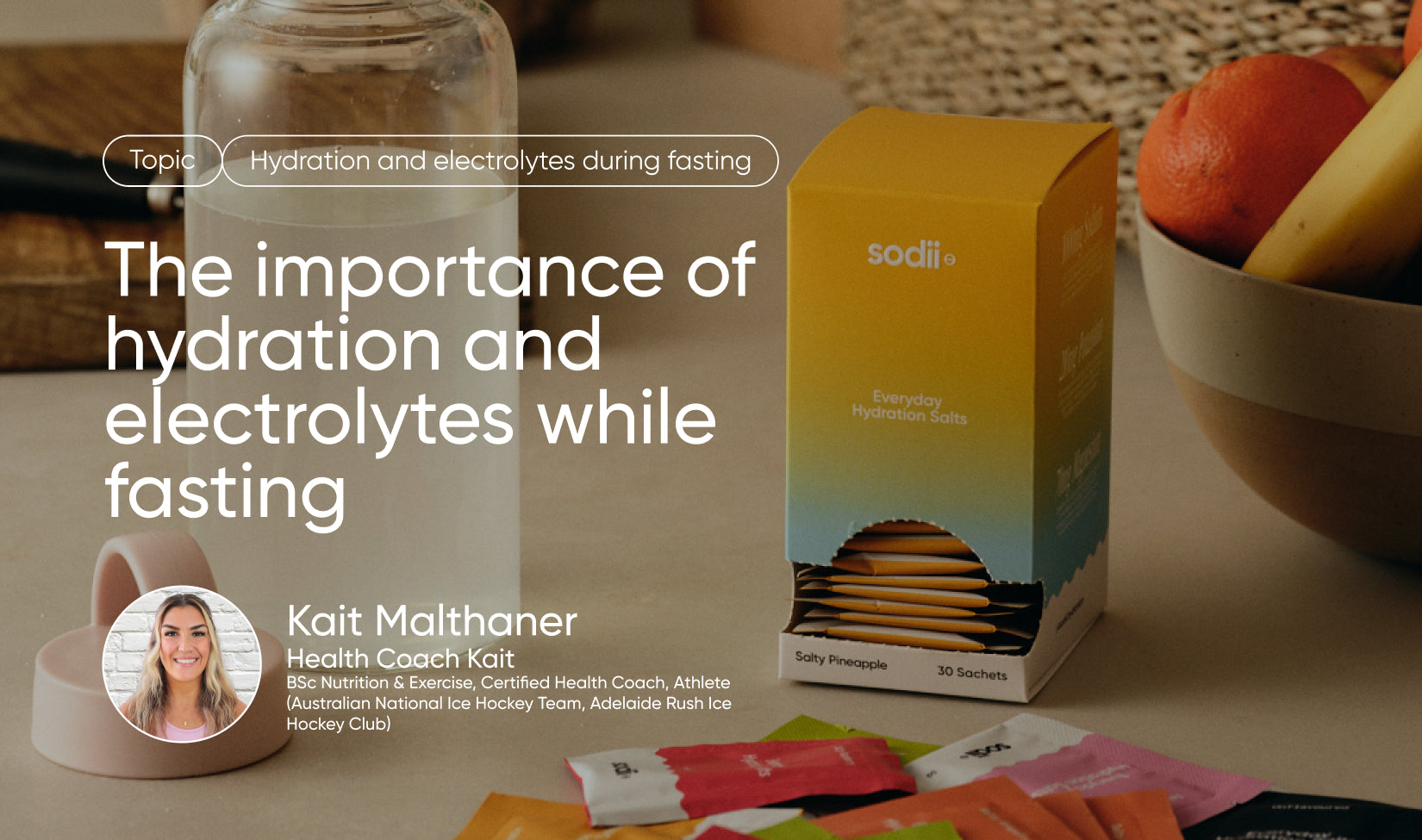Written by Health Coach and Nutritionist, Kait Malthaner
Intermittent fasting (IF) has become increasingly popular for its health benefits, such as weight loss, lowering blood sugar and enhancing mental clarity. A common IF strategy is the 16/8 approach, which involves fasting for 16 hours each day and consuming all daily calories fuel within an 8-hour eating window. While this approach can be effective and relatively easy to follow, one crucial, but often overlooked, aspect is proper hydration.
Maintaining hydration during fasting periods is essential to avoid dehydration. Yet, many people starting a fasting routine underestimate the importance of hydration and don’t understand what it fully means.
Understanding What Breaks a Fast
During fasting, the body experiences several metabolic changes. One of the most notable is a decrease in insulin levels, which allows the body to shift from burning glucose to burning fat primarily for energy. This metabolic switch promotes fat loss and helps induce a state called “ketosis”, where the body begins to use stored fat as its primary energy source.
Anything that triggers insulin release is considered to “break a fast”. Therefore, this would mean any intake of calories. However, it is generally agreed that small amounts of low calorie drinks like black coffee, tea and electrolyte supplements generally do not disrupt the fasting state significantly and will not take away from the benefits. The key is to avoid anything that triggers a substantial insulin response.
Understanding what breaks a fast is particularly important when it comes to hydration strategies. For example, a flavoured electrolyte drink with sugar, artificial sweeteners or added carbohydrates could interrupt the benefits you are trying to obtain from fasting. On the other hand, sugar-free electrolytes will not, and can be consumed during a fast.
The Role of Electrolytes in Hydration
When most people think about hydration, they think about water. But hydration is more complex than that. You need to maintain the right balance of water and electrolytes to be properly hydrated. Electrolytes are essential minerals such as sodium, potassium and magnesium that carry an electric charge and play key roles in nerve function, muscle contraction and maintaining fluid balance in the body.
During fasting the body loses more water and electrolytes due to the lower insulin levels. Insulin has a water-retaining effect, so when it drops during fasting, the kidneys release more sodium and water. While this natural diuretic effect can be beneficial for reducing water retention, bloating and blood pressure, it also increases the risk of dehydration and electrolyte imbalance leading to side effects.
If these minerals aren’t replenished adequately, symptoms like dizziness, muscle cramps, fatigue and brain fog can occur. This is why many people find it hard to start intermittent fasting. It’s not the fast itself, but the lack of proper electrolyte balance.
Electrolytes and Cognitive Function
Another overlooked benefit of electrolyte balance during fasting is its impact on brain function. Sodium, magnesium and potassium all play a role in nerve signaling and brain function. When these minerals are depleted, you may experience brain fog, difficulty concentrating or mood swings.
In contrast, when electrolyte levels are optimised, you may find that intermittent fasting enhances mental clarity, focus and productivity.
Key Signs of Dehydration and Electrolyte Imbalance During Fasting
Recognising the symptoms of dehydration and electrolyte imbalance is important for anyone practicing intermittent fasting. Here are some common warning signs:
- Dizziness or lightheadedness
- Muscle cramps
- Fatigue or weakness
- Headaches
- Dry mouth and skin
These symptoms can make it hard to stick to intermittent fasting consistently. Some hunger and fatigue is normal during fasting, but experiencing these symptoms continuously is not.
Hydration Strategies During Intermittent Fasting
So how do you stay properly hydrated while fasting? Here are three key strategies:
1. Prioritise Water Intake
Water should be your primary fluid source while fasting. Aim to sip water consistently throughout the day, rather than waiting until you’re thirsty. You will need more if you’re physically active, live in a hot climate or are losing fluid through sweat. Adding a pinch of high quality salt to your water throughout the day is a great way to replace the minerals lost in conventionally filtered water.
2. Incorporate Electrolyte Supplements
Because fasting increases the loss of sodium, potassium and magnesium, supplementing these minerals is often necessary, especially if you’re doing extended fasts, engaging in regular exercise or sweating more. Incorporating an electrolyte supplement that contains zero-added sugar and not enough calories to break your fast.
3. Monitor Physical Activity
Physical activity can accelerate electrolyte loss through sweat, especially during high-intensity workouts or long periods of cardio. If you exercise while fasting, it’s important to pay extra attention to electrolyte replenishment before and after your workout.
So, electrolyte packed hydration during fasting? Big yes.
Proper hydration during intermittent fasting is more than just drinking water. It includes maintaining the right electrolyte balance. Whether you’re fasting for weight loss, mental clarity or another reason, staying hydrated and replenishing essential minerals is key to maximising the full benefits of intermittent fasting.
